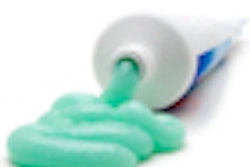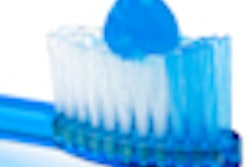Triclosan, which is used in toothpaste to protect against gingivitis, is not harmful to humans but can harm the environment, according to the findings of a Canadian investigation.
Health Canada has been probing the effects of triclosan on the body's endocrine system and whether the antibacterial agent contributes to the development of antibiotic resistance along with the effect of widespread use on the environment.
In a preliminary assessment issued March 30, the Minister of Health called for voluntary reductions in the use of triclosan in products, according to a government press release. The government is also proposing to list the chemical as toxic to the environment.
When used in toothpastes, soaps, and other items that are rinsed off and washed down the drain, the amount of triclosan that is released into the environment can affect plants and animals in lakes, streams, and rivers, Health Canada noted.
The government found no clear link between use of products containing triclosan and antibacterial resistance.
The U.S. Food and Drug Administration has been conducting its own investigation of triclosan for the last two years.



















